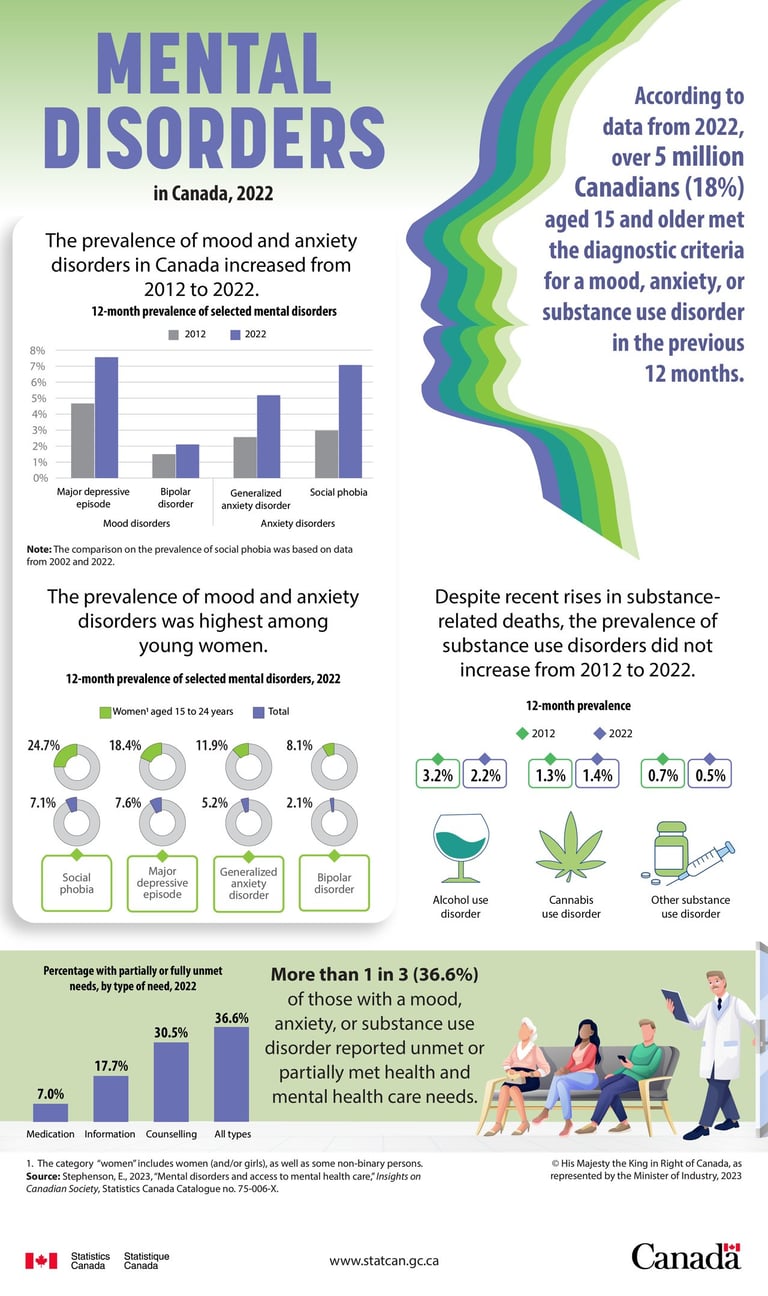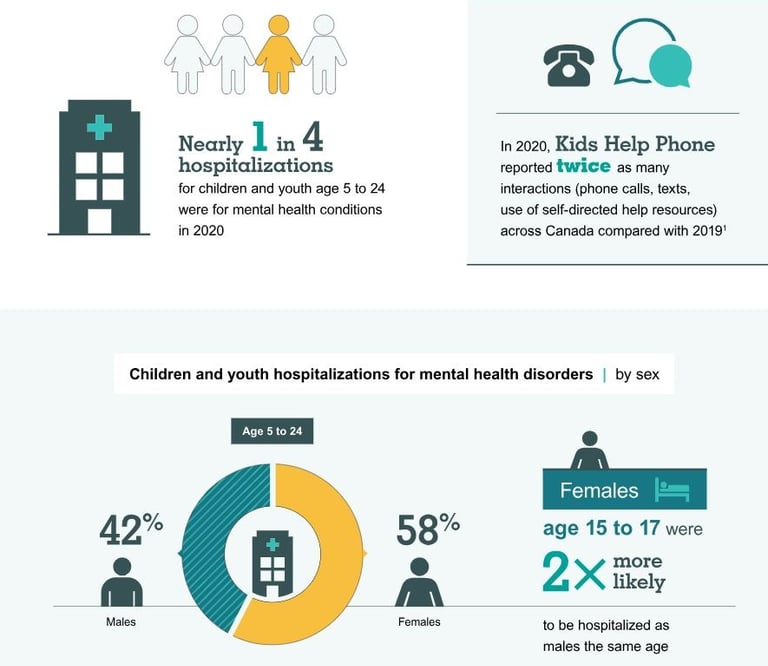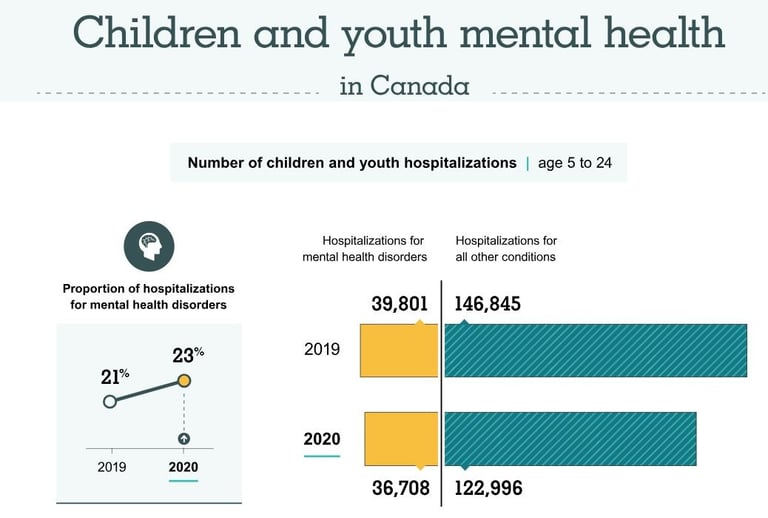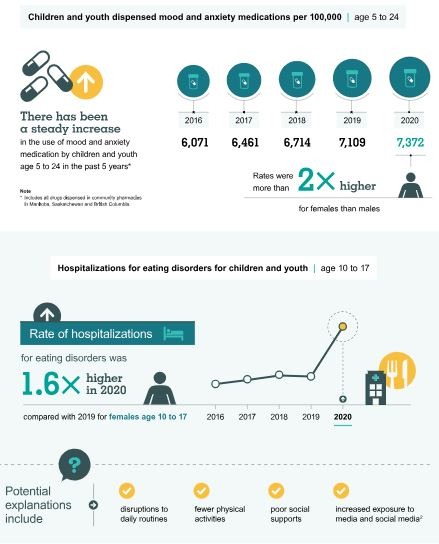MENTAL HEALTH INFORMATION AND STATISTICS (CANADA)
CAMH Switchboard
From the GTA: 416 535-8501
Toll-free: 1 800 463-2338
To Access CAMH Clinical Services
416 535-8501, press 2
Canadian Mental Health Association, National
250 Dundas St. West, Suite 500
Toronto, Ontario M5T 2Z5
Phone: (416) 646-5557
E-mail: info@cmha.ca
Charitable Registration Number:
10686 3657 RR0001
Mental disorders in Canada, 2022


The Canadian Chronic Disease Surveillance System (CCDSS) is updated annually and is supported by a pan-Canadian partnership between the Public Health Agency of Canada and all provinces and territories.
Learn more about mental illness:
Visit Canada.ca Canada.ca and search "Mental Illness"
Get data in the Data Tool
Like us @HealthyCdns
Follow us @GovCanHealth
Mental illness in Canada Published:(2020-10-08)
Mental illness is characterized by changes in an individual's thinking, mood, or behaviour and is usually associated with significant distress or impaired functioning in social, occupational or other activities.
Examples of mental illness
major depressive disorder
bipolar disorder
generalized anxiety disorder
posttraumatic stress disorder
schizophrenia
eating disorders
substance-related disorders
Mental illness can affect anyone. Some factors have been associated with mental illness, including:
family history
stressful life events
negative early life experiences
socio-economic status
Early care and seeking treatment can help individuals recover from or manage a mental illness. However, stigma and other barriers can delay people from seeking help.
Mental illnesses have a significant impact on the health of Canadians as well as the Canadian economy, including our health and social care systems.
1 in 3
1 in 3 Canadians (about 9.1 million people) will be affected by a mental illness during their lifetime
According to the most recent findings from the Public Health Agency of Canada’s Canadian Chronic Disease Surveillance System (CCDSS)
1 in 7
Every year, about 15% of Canadians use health services for a mental illness.
5.5 million
Close to 5.5 million Canadians received health services for a mental illness in 2016-2017. That's more than the population of British Columbia.
Female vs. Male
Canadian females are 30% more likely than males to use health services for mental illness.
Young Canadians
In 2016-2017, Canadians aged 19 and under had the lowest proportion of health services use for a mental illness (10.7%).
However, there is an increasing trend in the use of health services for mental illness among young Canadians. From 2000-2001 to 2016-2017, the proportion of Canadians aged 19 and under using these services rose an average of 2.6 % per year.
From the data collected during our national polling series, below is a snapshot of key facts learned through tracking mental health.
More than 1 in 2 people (52%) struggling with their mental health aren’t getting the help they need. This is just over half of the 15% of people who are either accessing mental health supports or feel they should be but are not accessing support (struggling).
Poll 17, full report, page 31.1 in 8 Canadians have been experiencing high levels of anxiety. Those indicating feeling high anxiety was 7% just before the pandemic and 11% now. 1 in 4 Canadians will receive a lifetime diagnosis of anxiety.
Poll 18, full report, page 9.15% of Canadians have accessed mental health services in the last year, an additional 6% believe they should but are not.
Poll 18, full report, page 29.33% of employed Canadians are burned out.* In some professions, however, it is much higher (e.g., 66% of nurses, and 61% of the mental health workforce).**
*Poll 14, full report, page 27; and **Psychological Health and Safety in Canadian Workplaces, page 20.Of those who accessed mental health services, one third accessed through a provincial health system.
Poll 14, full report, page 34.We have noted higher negative mental health statistics for LGBTQ+ ,younger Canadians and health care professionals. 30% of Canadians who identify as LGBTQ+ have thought about suicide in the past year.






